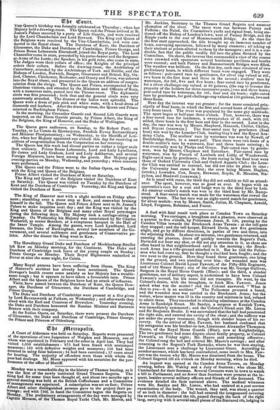Monday was a remarkable day in the history of Thames
boating, as it was the first of the newly instituted Grand Thames Regatta. The thing had for some time been thought of, and about two months ago a general meeting was held at the British Coffeehouse and a Committee of management was appointed. A subscription was set on foot ; Prince Albert and other distinguished persons gave to the project their patronage; and with 7501. in hand the Committee began the Regatta on Monday. The preliminary arrangements of the day were managed by Captain hIeesom, of the Thames Royal Yacht Club, Mr. Morris, and Mr. Jenkins, Secretary to the Thames Grand Regatta and amateur champion of the river. The races were run between Putney and Fulham; the Naiad, the Committee's yacht and signal-boat, being stationed off the Bishop of London's lawn, west of Putney Bridge, and the Ripple yacht to the east of Hammersmith Bridge. As the time for the first start approached, the tide brought up an immense number of boats, conveying spectators, followed by many steamers ; all taking up their stations at points allotted to them by the managers ; and it is a creditable fact that the public readily fell into the plans dictated by the Committee. On shore, the taverns that commanded a view of the course were crowded with spectators several handsome pavilions and booths were erected ; and both Putney and Hammersmith Bridges were filled. The weather was brilliant. On the first day, each race consisted of two preliminary heats, in which different boats were engaged. They were as follows : pair-oared race by gentlemen, for silver cup valued at 40/, two boats in the first heat and three in the second ; scullers' race by watermen, for 301., five and five boats ; four-oared race by gentlemen,. for a silver challenge-cup valued at 80 guineas, (the cup to become the property of the holders for three successive years,) two and three boats ; pair-oared race by waterman, for 501., four and six boats ; eight-oared race by gentlemen, for gold challenge-cup valued at 150 guineas, two and three boats.
Next day the interest was yet greater ; for the races consisted principally of final heats, in which the first and second boats of the preliminary heats raced. The river was populated by the same gay multitude. The sport began at half-past three o'clock. First, however, there was a four-oared race for landsmen, a sweepstakes of 2/. each, with 20/. added, three boats in the first heat and four in the second. Later in the day, the race was won by Messrs. Shepherd, Hancock, Chiller, Chiller, and Bryant (coxswain.) The four-oared race by gentlemen (final heat) was won by the Leander Club, beating Guy's and the Royal Academy Clubs. The scullers' race by watermen was won by Newell, of Battlebridge Stairs, in a smart pull. Then there were two heats of a double. sculler's race by watermen, four and three boats entering ; it was eventually won by Phelps and Green. Pair-oared race by gentlemen, won by Messrs. Chapman and Earnshaw. Pair-oared race by watermen, won by Pocock of Lambeth and Liddy of Wandsworth. Eight-oared race by gentlemen ; the boats racing in the final heat were those of Oxford University Club and Oxford Aquatic Club ; the Leander Club was entitled to contend, but did not take its place in time : the University boat came in first ; the crew being Messrs. Hughes. (stroke,) Lowndes, Cox, Bourn, Brewster, Royds, R. Menzies, Stepylton, and Shadwell (coxswain.) As is usual with races, the third day did not exhibit so full an attendance. The sport, however, was as good as ever. It began with an apprentice's race for a coat and badge won in the third heat by Lett. An amateur sculler's match was won in the third heat by Mr. Bumpstead. A four-oared match was made for the watermen that rowed the umpires' boats. The last race was an eight-oared match for gentlemen, for silver medals : won by Messrs. Smith, Julius, H. Chapman, Arnold, Lloyd, Ferguson, Robinson, and Foster.


























 Previous page
Previous page